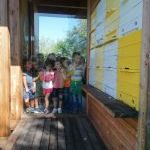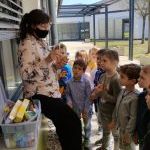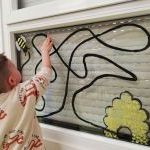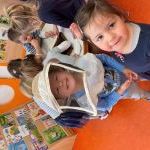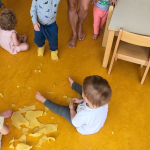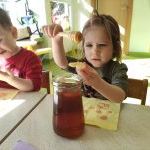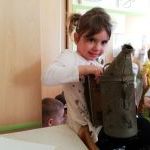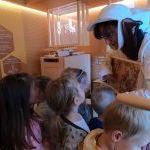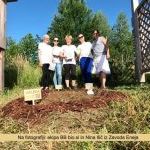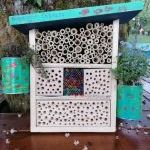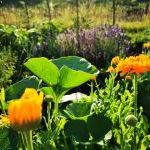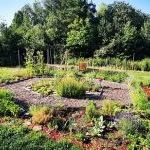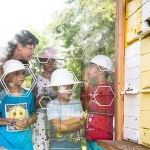Bee Path and API Kindergartens
In 2015, the City of Ljubljana started Bee Path, as tourist product with many different contents, which is now a movement of 43 partners. The goal is to present natural and cultural heritage of bee-keeping, with special emphasis on urban bee-keeping. The municipality supports programmes, some of them are children oriented, such as API Kindergarten, lead by pedagogical expert with additional skills in beekeeping and apitherapy from Institute Eneja. Kindergartens often have their own melliferous (bee-friendly) garden. The first Api kindergartens started as a pilot project in 2019/20. The pedagogical programme is aligned with pedagogical principles of the Kindergarten Curriculum, with Ministry of Education, Science and Sport and National Institute for Public Health.
Website
Useful links
Ljubljana - winning bee-friendly municipality
The British BeeKeeping Association provides visits to schools and help with keeping bees
Country
Media
Photos: Zavod Eneja
* TOP TIP *
'Sow bee friendly wildflower seeds in your school grounds to attract bees'
How is the project linked to climate change and sustainability?
Bees are necessary for life of the plants in the planet and also everything else - animals and people. Without bees pollinating our food we could become extinct within a few years. Teaching the youngest about the role of the bees and about their importance means that they will respect them and maybe some of children will want to work with them in the future. What is not good for the bees it´s also not good for the planet - through learning about bees they learn also about sustainability and what is the best for the planet.
Who is involved?
The project involves children and teachers from kindergartens and schools; the apitherapist and professional head of API pedagogical programmes at Eneja Institute for the development of empathy and creativity; citizens and different institutions along the Bee path (restaurants, hotels and organisations with bee hives); the Bee Association of Slovenia and local bee producers.
How are the participants involved?
The Bee Path is a movement of 43 partners in the City of Ljubljana, and each year they present their products on a special Honey Day. Along the Bee Path there are bee hives at different stops: on the roofs, in the parks, and even at Ljubljana Castle. One of the stops in Slovenian Ethnographical Museum with objects dedicated to beekeeping, and another at the city apiary at the University Botanical Garden. At some stops there are educational activities for kindergartens, schools and citizens.
Bee Path partners carry out individually different activities:
1. 'Help the Bee – Flower-up the City' encourages planting of melliferous (bee-friendly) flowers
2. The international project URBACTIII 'BeePathNet' and BeePathNetReloaded with nine European cities, which want to transfer this good practice and develop urban beekeeping.
3. Api Kindergartens enable children to have regular pedagogical activities dedicated to bees once per week. The topics include Slovenian bees, bee products, the life cycle of bees, biodiversity & environment protection, healthy lifestyle and horticulture. Children learn how to behave around the apiaries and stay safe. The Api Kindergarten programme is adjusted to the child´s age and the main methods are play and exploring. It is based on sensory experiences and active involvement of children. The programme is also an opportunity for the professional and personal growth of teachers.
4. In their own meliferous garden children build hotels for wild bees maybe also nests of ground nesting wild bees. Children discover how they are built and get to know more about their habitat and biology. Institute Eneja performs professional educational programmes for pedagogues of API kindergartens, holds lectures at international conferences about beekeeping, apitherapy and pedagogic activities.
Key steps:
Do you want to know more about the life of bees and meliferous gardens? Here are some ideas on how to create your own Bee Path at school:
- Do you have a place where you can set up a meliferous garden at your school or kindergarten?
- Find out what this garden should look like - ask an expert from a local beekeepers association for advice.
- Do you have people who would take care of it? Invite parents and the school community to get involved.
- Where will you get the plants or materials or this garden? Think about how to raise some money or equipment.
- Think about setting the bee-hotel in your garden.
- Do you know what animals you can observe in this garden? You can set the course, where children would take care or the garden and learn more about animal visitors, including the bees who come here. Who could be mentor of this course?
- You can explore bee products and learn more about their benefits with bee-keeper or apitherapist.
- Explore how bee products are connected with the culture of your nation. What are the bee products? Where in your city or surroundings you can see the connection with bees? (beehives, bee-product shops, bee museums, important people connected with bees)
- Contact bee-keepers and bee-keeping associtaions to see if you can visit to see how bees live and how they makes all the products.
- Ask a Bee-keeping Association if they can set up an observational bee-hive with a glass wall, which more schools and kindergartens could visit.
- Present your work to the public and parents – you may attract some new children and mentors. Don’t forget to invite the journalists as well.

